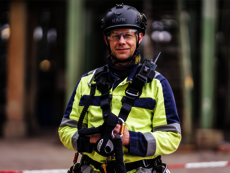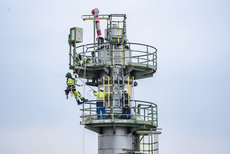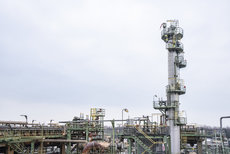Rope-secured work at
heights as an industrial
climber from Bilfinger

My job is full of challenges, but that's what makes it so exciting and diverse"
Doing maintenance work on industrial plants while hanging 40 meters above the ground and secured only by two ropes? Nothing new for Michael Bartalov. The industrial climber talks to us about his exciting profession and reveals why fear of heights is sometimes completely normal.
“My job is full of challenges, but that's what makes it so exciting and diverse,” says the trained adventure educator. “I can clearly remember when I joined Bilfinger in mid-December 2020. Up to then, the colleagues had been using scaffolding to carry out access to work on our customers' plants. But especially at difficult-to-access industrial plants, it became clear that this is not always the easiest or the fastest way to do things. The Industrial Climbers department was therefore established at Bilfinger arnholdt GmbH. The fact that we could gain access to the plant secured by ropes was unthinkable for many. But when we were able to prove the opposite, our customers were thrilled and now can't imagine doing some of the work on their plant without us climbers.
What does it mean to be an industrial climber? What does a typical day at work look like?
“Being an industrial climber means much more than working all day at heights on equipment. It requires thorough preparation before we get into a project. And it is precisely this preparation that makes me feel safe at heights. We inspect the plant in advance, draw up risk assessments and rescue concepts, and only when these have been written and are feasible do we opt to carry out the project. We then select the appropriate equipment for climbing the facility from our portfolio. Access concepts and rescue and work training are then developed and completed before the actual project work on the rope begins. In my opinion, the work we do in advance is much more intense than the actual rappelling up and down. The preparations are incredibly important. Not only to check the safety of the work material, but also to build confidence."
What was the most exciting project you experienced at Bilfinger so far?
There is absolutely no doubt in my mind; it was definitely the first assignment that I was involved in. At that time, we climbed a 40-meter-high column to do some inspection work. Special about this job was that it was not only my first time working for Bilfinger as an industrial climber, but also the first time our long-standing customer had worked with us industrial climbers. This had never happened in the past, because scaffolding was always used. I remember very clearly how thrilled and amazed our customer was at the time that we were able to carry out the work so smoothly and quickly. That was a great feeling.

And what do you do if you are afraid of heights?
“That's actually normal and part of the job. If you're not afraid, you're more inclined to take avoidable risks. And that's extremely dangerous in our job. Just because you're an industrial climber doesn't mean you never have a fear of heights, or maybe just a queasy feeling when you look down. The important thing is to stay calm in such moments. We talk to each other first, make sure we can have complete confidence in our equipment and our team, and some of us like to eat a piece of chocolate to fire up the happy hormones. Safety always comes first in our job and is a top priority.”
How would you describe the work in your team?
“The fact that we all have this unusual profession means we have a lot in common. We are a close-knit group and we trust each other unconditionally. We also do a lot together in our private time, climbing not only at industrial facilities, but also in our free time at indoor walls or climbing parks. However, we want to expand our team and are looking for new colleagues.”

Are you looking for experienced industrial climbers or do career starters also have the chance to become part of the team?
“Both! We would be happy to welcome anyone who shares our passion. We are currently in the process of setting up a training center for industrial climbers in Herne. Then we will be able to train our experts ourselves. Industrial climber is not a conventional apprenticeship, however, but rather a continuing education program. You should already have a technical education to be able to take up the profession. There are three different levels you can reach through additional training, depending on the practical and theoretical knowledge you acquired during your apprenticeship.”
So what does a future industrial climber need to contribute?
“Clearly heart and soul! In this profession, you have to be fully committed to the job. You have to be prepared to do unusual work, keep physically fit and constantly improve your skills, and have a technical education. With these qualities, you will fit right in with our team. We can't wait to welcome more climbing-crazy colleagues.”
